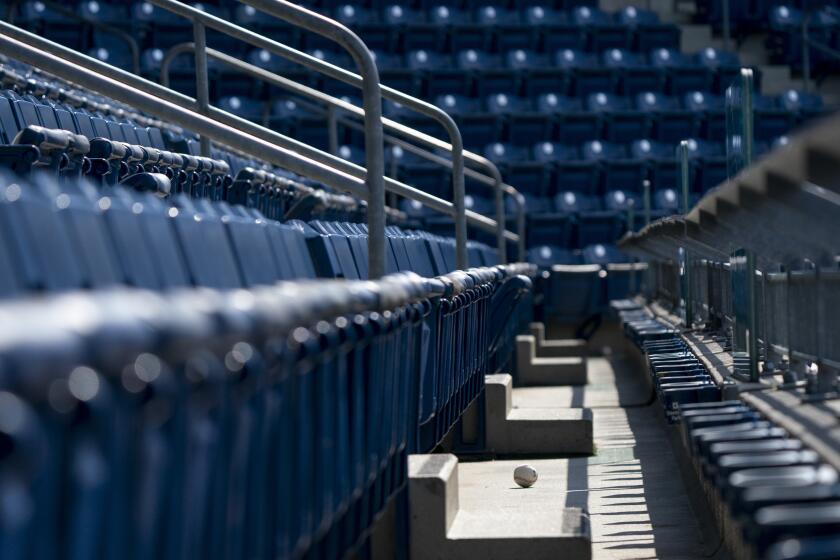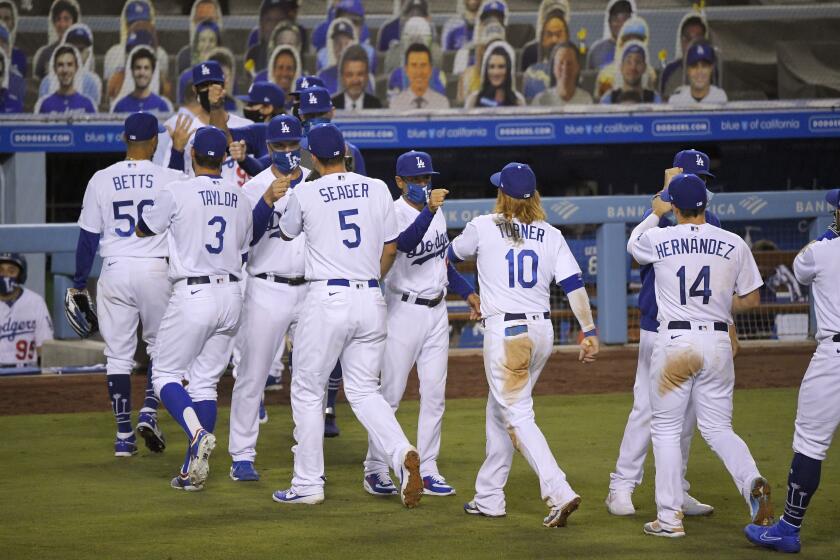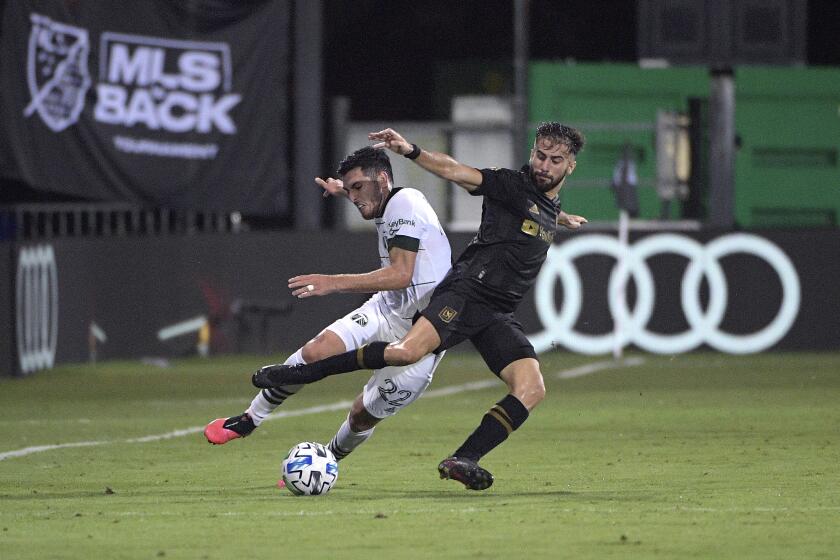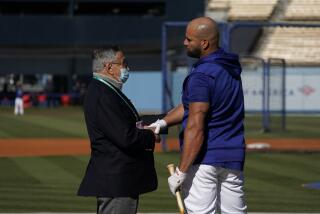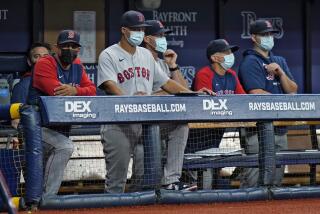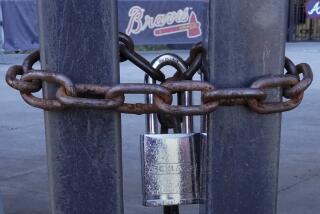Apprehension grips MLB after a serious coronavirus outbreak among Miami Marlins
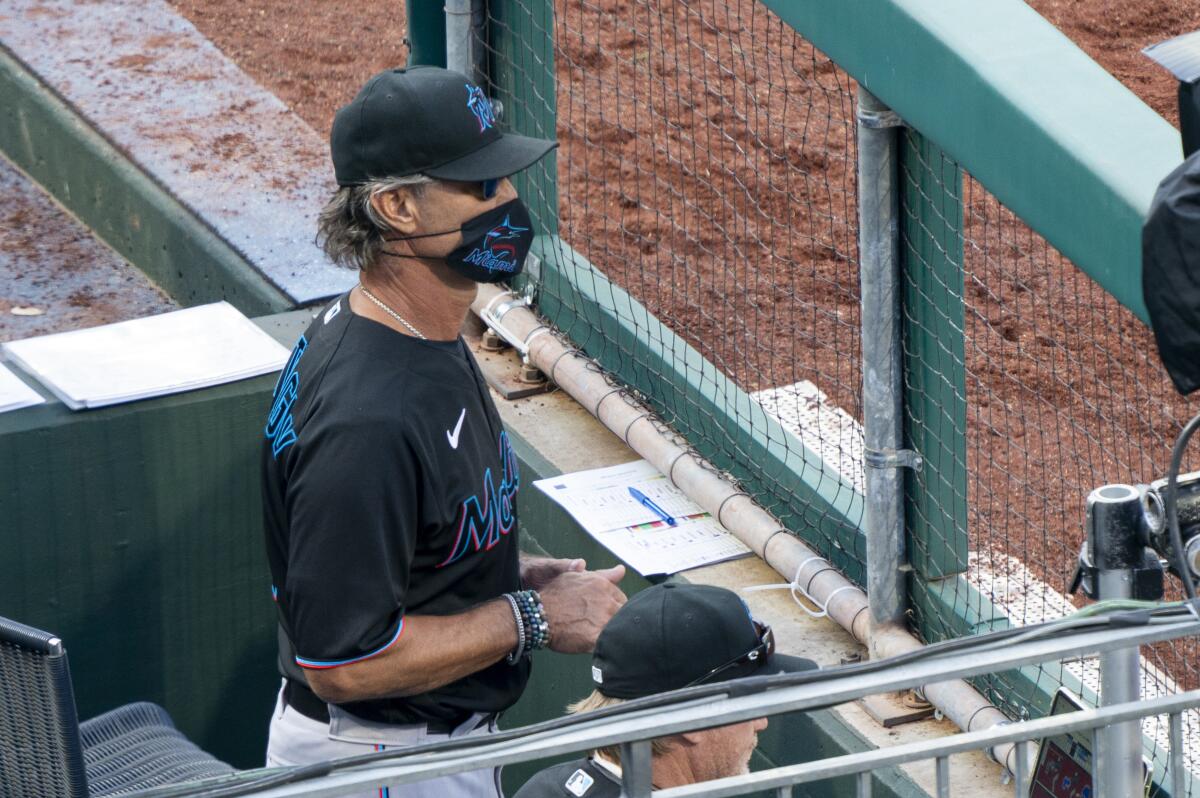
- Share via
After four months of waiting, Major League Baseball dispersed its teams throughout a country fighting a pandemic, hoping health and safety protocols would allow the league to cram in a 66-day season without a coronavirus outbreak.
That hope lasted four days.
On Monday, after 11 players on the Miami Marlins tested positive for the virus, the league postponed three games. The Marlins would have played in Miami on Monday and Tuesday, but those games were postponed. The Marlins did not leave their hotel in Philadelphia, amid an expedited round of testing.
The Baltimore Orioles, the team that would have been the Marlins’ opponent, landed in Miami, then flew back to Maryland. They might play the Marlins in Baltimore on Wednesday, depending on the Marlins’ test results.
The Philadelphia Phillies would have played the New York Yankees on Monday, but that game was postponed too, as the league rushed additional tests to the Phillies, who shared the field with the Marlins on Sunday.
At least 13 members of the Miami Marlins tested positive for COVID-19, yet baseball soldiers on. What would be the breaking point in MLB and other sports?
If the Marlins do not play their scheduled games against Baltimore this week, their next opponent would be the Washington Nationals — in Miami, where the virus is raging. Nationals manager Dave Martinez, who has a heart condition, did not try to hide his apprehension.
“I’m scared,” Martinez said. “I really am.”
Aside from the postponements, and amid calls from scientists for MLB to keep the Marlins off the field for two weeks, the league proceeded with its schedule. Commissioner Rob Manfred held a conference call with owners and said there “really wasn’t” discussion of halting the season.
“We built protocols anticipating that we would have positive tests at some point during the season,” Manfred said on MLB Network, referencing the 60-man player pools. “The protocols were built in order to allow us to continue to play through those positives. We believe the protocols are adequate to keep our players safe.”
Martinez ended his videoconference and went on to manage the Nationals on Monday. The Marlins supplemented their roster by claiming two pitchers on waivers. The Angels played in Oakland; the Dodgers flew to Houston.
“I don’t believe there is going to be any panic just yet,” Dodgers president Stan Kasten told MLB Network Radio. “I think we understood that there might be occasions like this, which is why we had our player pool as big as it is. …
“Hopefully, this is the worst outbreak we have for the rest of the season, because it will teach us some things. I do think we expected something like this at some point, and maybe getting it out of the way early will help teach us things to avoid the repetition of this.”
In Oakland, when the Angels put a runner on first base, A’s first baseman Matt Olson put on a mask. In Cleveland, where Chicago White Sox manager Rick Renteria woke up with what the team called “a slight cough and nasal congestion,” the team sent him to a hospital to get tested, then back to his hotel to quarantine as he awaited the result. The White Sox learned late Monday that Renteria tested negative, the Chicago Sun-Times reported.
The Dodgers consider the perils of travel after many Miami Marlins test positive for COVID-19, and revenge over the Astros’ sign-stealing is secondary.
In a statement, Marlins chief executive Derek Jeter said postponing Monday’s home opener would enable the team to “take a collective pause and try to properly grasp the totality of this situation.”
Jeter also said: “The health of our players and staff has been and will continue to be our primary focus.”
That left open the question of why team executives and league officials left it to the Marlins players to decide whether to play Sunday, when four players already were unavailable after testing positive. The MLB health and safety protocol requires isolation of infected players and expedited testing for others in close contact, but Emory University epidemiologist Dr. Zachary Binney said four infections should have been enough to declare an outbreak on the Marlins.
Beyond the four players who tested positive, Manfred said a number of others were quarantined before Sunday’s game after the Marlins considered which players had been in close contact with those infected.
Said the Dodgers’ David Price, who opted out of playing this season: “Now we REALLY get to see if MLB is going to put players health first. Remember when Manfred said players health was PARAMOUNT?! Part of the reason I’m at home right now is because players health wasn’t being put first. I can see that hasn’t changed.”
Manfred disagreed with Price’s comments and said the health and safety concerns were of primary importance to both the league and the players’ union. Manfred noted MLB would call off more games if needed to protect player safety.
“You get to a certain point league-wide where it does become a health threat,” Manfred said, “and we certainly would shut down at that point.”
The Marlins, however, have not been shut down, even for a week or two. Manfred said that would come into play if the Marlins could not field a competitive team, even with their 60-man player pool.
“A team losing a number of players that rendered it completely non-competitive would be an issue that we would have to address,” he said.
Binney said that because 11 Marlins players tested positive and others are isolated, the organization should shut down for at least two weeks.
“You need to let the virus clear itself out of the clubhouse, because it can sometimes take a long time for the virus to show itself, on a positive test or through symptoms,” Binney said.
“You have to wait it out. You have to assume everybody on the Marlins right now is potentially infected. The only way to get past that is time.”
Binney also recommended the Phillies halt their season until at least Friday.
“I think the Phillies should be put on ice for at least five days and tested daily, and they can wait to see if any cases appear with them, because they were on the field with a team with a rampant outbreak,” he said.
The MLB protocol calls for contact tracing, the core principle of which is to identify people that have come within six feet of an infected person for at least 15 minutes. If players remain apart on the field and in the clubhouse, as prescribed by the protocol, few players should have come into close contact. However, televised games over the weekend repeatedly showed personnel sitting closer than six feet together in dugouts, and the occasional hugs and high fives. Manfred said “enforcement” of the protocol is as important as the protocol itself.
“Contact tracing is about slowing the spread of an outbreak,” Binney said. “If I’m starting from a low number of cases, hopefully I’m keeping that from turning into an outbreak. If you were able to reliably identify any member of the Phillies organization that had any close contact with anyone from the Marlins, then I suppose you could just quarantine those people. But they’ve already canceled the game tonight. So that tells me they’re very afraid that maybe there was quite a bit of contact.
“This is your first experiment to see whether the virus can spread from one team to another, or from one team to their opponent during a game. I would want to wait for the results from that experiment, rather than wait for the results from contact tracing.”
Angels manager Joe Maddon said he would reserve his level of concern until MLB can determine the source of the Marlins’ outbreak. As of now, Manfred said, the league has “some theories” but “nothing definitive.”
After a rough start that included numerous positive coronavirus tests and withdrawal of two teams, the MLS Is Back tournament has entered its knockout stages.
“If there was a breach of protocol by any of those players, then it’s more easily explainable,” Maddon said. “If not, then it becomes more problematic.”
Angels pitching coach Mickey Callaway said, “When something like that happens, it makes everybody a tick more nervous.”
The United States and South Korea each reported its first case of the virus on the same day, Jan. 20. In South Korea, where the national public health response has been effective, baseball returned in May, with a plan to shut down the league for two weeks in the event of an outbreak. By now, fans have returned to the ballpark.
In the United States, where there has been no effective national public health response, MLB has not shut down amid an outbreak, the only fans in the ballpark are cutouts, and a manager with a heart condition is extremely worried.
“My level of concern went from about an 8 to a 12,” Martinez said. “This thing really hits home now that you see half a team get infected.”
More to Read
Go beyond the scoreboard
Get the latest on L.A.'s teams in the daily Sports Report newsletter.
You may occasionally receive promotional content from the Los Angeles Times.

